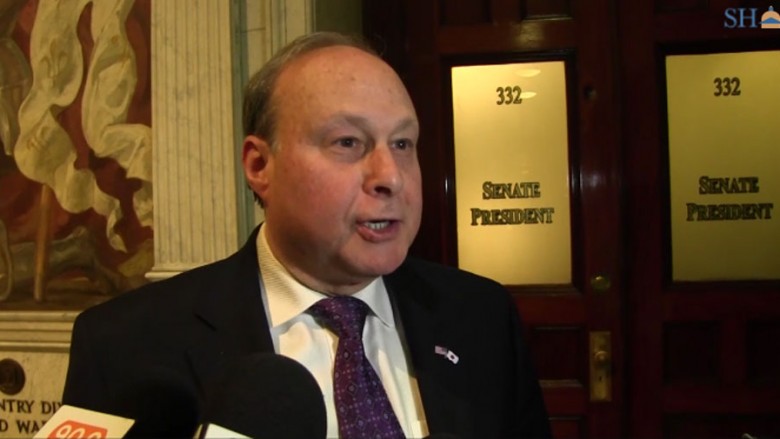DeLeo, Rosenberg concerned over commitment measure in opioid bill
By State House News Service | October 20, 2015, 6:06 EDT
 Senate President Stanley Rosenberg speaks with reporters outside his State House office in October. (State House News Service photo)
Senate President Stanley Rosenberg speaks with reporters outside his State House office in October. (State House News Service photo) STATE HOUSE — The Legislature’s top two Democrats expressed reservations on Monday about one of the main provisions of Gov. Charlie Baker’s opioid abuse prevention plan that would allow doctors to commit patients with substance abuse issues for up to 72 hours without a court order.
Baker met with House Speaker Robert DeLeo and Senate President Stanley Rosenberg for over 90 minutes on Monday afternoon during which time the three leaders “talked a lot about opioids,” according to the governor, along with energy and the impending closure of Pilgrim Nuclear Power Station.
Though DeLeo said the governor was able to address his concern about how a proposed 72-hour supply limit on opioids would impact patients with chronic pain, the Winthrop Democrat said more discussion would be needed to “ease my mind” about committing patients to a hospital against their will for 72 hours.
DeLeo said Baker explained to him that those with chronic pain would have a “carve-out” from the 72-hour limit on prescription supplies, which would not require those patients to return frequently to their doctors if they needed additional pain management medication.
“The other concern I have that I think we can address as well is taking the judge out of the process in terms of whether you commit a person or don’t commit a person and I think we need to have further discussion about that,” DeLeo said.
Rosenberg said the Senate had spoken on the issue of limiting access to large quantities of opioids in its comprehensive abuse prevention and education bill, but said he was giving a “big yellow light” to Baker’s involuntary commitment proposal.
“We have to be extremely careful about this because, as the speaker said, you have to find the right balance point here. We want to save lives and we know people are in very rough shape in many of these situations, but we have to be really careful that we don’t deny them their liberties and their ability to make their own decisions and choices,” Rosenberg said.
As for the limit on pills, the Senate has already passed a bill that would direct doctors to discuss with patients both quantity of medication and the potential dangers. Under the Senate bill, patients would be able to request that only a portion of their full opioid prescription be filled, but they could not return to a pharmacy seeking the remainder of the prescription without seeing their doctor first.
The Baker administration has defended its proposal to allow doctors to commit patients for treatment without a court order as mirroring similar laws that allow for involuntary commitments of patients with mental health issues that present an “immediate threat” to themselves or others.
Asked whether mental health and addiction should be treated differently or if he sees a difference in the two conditions, Rosenberg twice said, “I don’t know.”
Further asked whether he has similar concerns about doctors holding mental health patients against their will, Rosenberg said, “I don’t know, I haven’t thought about it.”
Both the American Civil Liberties Union of Massachusetts and the Massachusetts Medical Society have also raised civil liberty concerns over Baker’s opioid commitment proposal.
DeLeo said he has no timeline for the House to act on a comprehensive addiction prevention and education bill, calling it “one of the biggest pieces” the branch will vote on this session.
“What I think even more important is we come up with a bill that can really mean something in terms of reducing opioid abuse here in the Commonwealth of Massachusetts, a bill that will save lives,” DeLeo said.
Formal sessions for the year end on Nov. 18, but resume in January and are scheduled to continue through July in 2016.
— Written by Matt Murphy
Copyright State House News Service











